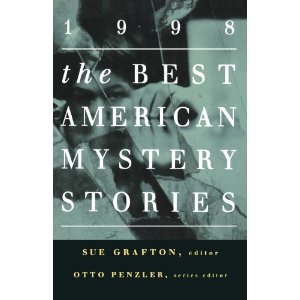Photo: Book's hardcover,
from robertbparker.net.
The real title is
Robert B. Parker's Damned If You Do, but if you read my reviews, you know how I feel about using a name as part of the title, especially if he's dead, so I won't further go at it here. But...argh...
And that's pretty much what I have to say about this book itself, as well. This is a giant step back from the other two Brandman novels, neither of which were exemplary to begin with. What a horribly written story! The dialogue is wooden and preposterous. The story is tired and distant. It's told and not shown. And it's got little writer edits at the end of some sentences, like Brandman's explaining it to us. (Note to Brandman: Mystery and procedural readers like to remember such things for themselves. Even if they're unimportant--because you don't know until the end what was important and what wasn't, right?)
There are too many examples to cite them all. There were so many that I had to put the book down and do something else. I actually groaned and complained out loud. And I can't find the one now I really wanted to put here, so...From page 247, after Jesse Stone saw a character, who he'd liked, die: "He hoped that the scotch would accomplish what he was unable to achieve himself...He wanted it to erase the haunting look in her dying eyes from his mind and his heart."
First, that's just bad writing. Second, that's telling, not showing. Third, if you've read Parker's--and even Brandman's--Jesse Stone works before, Stone (and the 3rd person narrator) would never think or speak like this. Fourth, we all know why people drink after they've seen someone they like die. Fifth, we all know why borderline alcoholics (or former alcoholics, which Stone is) drink after such an event. Sixth, that last sentence--melodrama, anyone? And Stone, and Parker--well, they're so anti-melodrama that this is just blasphemy, in of itself. And I know that comparing Brandman and Parker is unfair because they're different people--but Brandman is so obviously trying to emulate Parker's sparse style, and failing so miserably at it, that the comparison is just here. I feel certain that Parker would be upset with this book.
And the action sequences are just as bad. This from page 239: "Suddenly everyone was on the move. Chairs scraped loudly and tables were overturned as people began to anxiously respond. There were shouts of panic. The crowd began a confused surge towards the exits."
Again, this is just bad writing. The word "suddenly" was used tons of times in this book. That's bad. When chairs scrape, it's loud. So that's redundant--and it tells. And it overuses adverbs, which I learned in high school and college is bad to do. When people are "on the move," what is that, exactly? When settlers are on the move, they're just walking along, and slowly. There's probably lots of dust. And when there are "shouts of panic" and scraping chairs and overturning tables--that's not how people "anxiously respond." That's chaos. Stuttering is anxiously responding. And notice the word "began" is used twice in this one short paragraph. Nobody begins to do something. That's a huge pet peeve of mine, and it's used a million times in this book. You're either doing that thing, or you're not doing that thing. In this image, the people were well beyond the "began to anxiously respond" stage, whatever that is. They were panicked and running over each other. By definition, a surge is an action in progress, so there's no "began" there, either.
Literally almost every sentence and every paragraph has an instance of lazy writing, bad writing, passive writing, and...Oh, man, it was just plain horrible. What a disappointment! I don't want the reader to think I'm just nitpicking here, or in a bad mood, or whatever. I'm telling it straight--the writing of this book is that bad.
So bad I was shocked at its badness.
So bad it gives hope to all unpublished writers out there--if this can find its way into Barnes & Noble, your book can, too.
So bad I pictured Parker rolling over in his grave.
So bad it was a blight on all the Jesse Stone books I've bought and read before--all in hardcover, too.
So bad that if someone else hadn't bought this book for me for Christmas, I would've stopped reading it.
So bad that I can't even say to save it for bathroom reading, which is the advice I usually give for bearably bad books. But this isn't even bathroom reading--unless you need to use its paper. Which you probably should.
This is so bad that it reminded me of Dorothy Parker's quip: "This is not a novel to be tossed aside lightly. It should be thrown with great force."
By the way, the characters and story are bad, too. Stone, a police chief, tells a mass murderer that he feels "surprisingly comfortable" that he's watching his back. I'm not kidding. I actually disliked Stone at the end.
The best things about this book are the title, and the cover. And that it ended.
Skip
it, even if you have all the others. It is worth having a hole in your
collection so you don't have to put yourself through this. It is that bad.
Don't even buy it in the remainder bin. Don't start off the new year with this. Don't do that to yourself.





.jpg)

